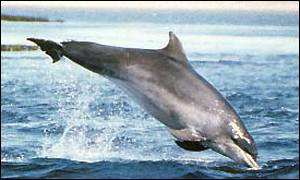|
Dr Lucas, MEP for the South East of England, said: "Scientists are reporting a link between LFAS and the deaths and beaching of marine mammals, some of which are legally protected endangered species.
"Fish stocks, already severely depleted around the UK, have also been affected by tests, according to the industry itself.
"The EU must act where Nato and member states have failed.
"LFAS technology must be subject to a rigorous environmental impact assessment to determine how many dolphins are dying and how much irreparable damage the sonar is doing to the marine environment.
"In the meantime, there must be no further testing or use of LFAS in European waters."
Disturbing
Nato members, including the UK, US and other states, have been developing LFAS submarine trackers for more than a decade.
They work by bouncing low frequency sounds at high volumes off the ocean floor, allowing operators to spot any large objects, such as submarines, and disrupt the signal.
The Green Party says the sounds used are up to 200 billion times louder than those which normally disturb marine mammals, causing internal bleeding, deafness and lung damage in dolphins and whales.
A Nato investigation conceded that a mass stranding of Curvier's Beaked Whales in Greece in 1996 could not have been caused naturally.
More recently, 15 beaked whales died after being washed up on the Canary Islands following military manoeuvres in the region of Nato's Mediterranean fleet.
Trawler nets
Post mortem examinations showed they had suffered brain legions and inner ear damage.
On Wednesday Lib Dem MP Matthew Taylor urged the UK Government to adopt a clear strategy to prevent dolphins from being caught in huge trawler fishing nets.
Since the beginning of this year the bodies of more than 40 dolphins have washed up on Devon and Cornwall beaches.
Top
|

